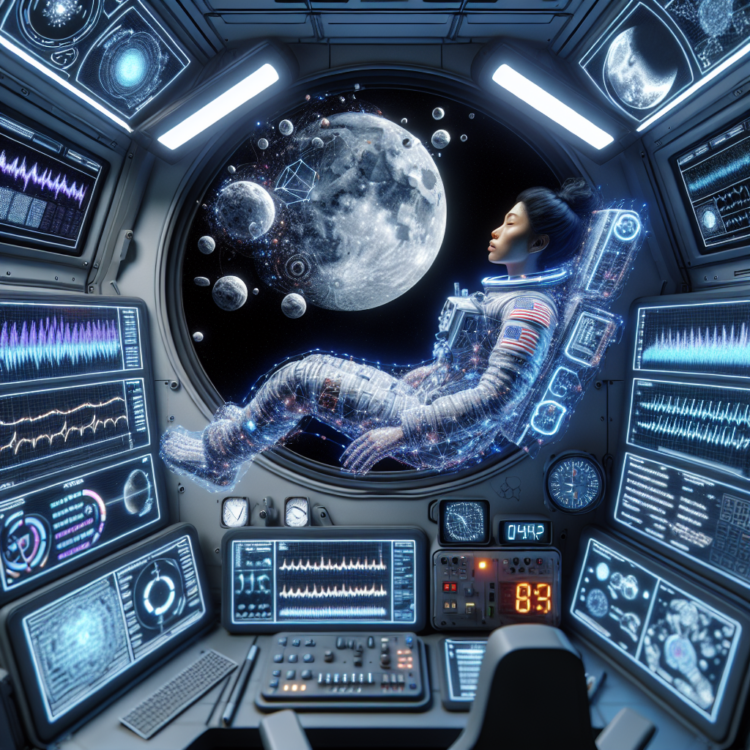Simulated effects of microgravity significantly affect rhythmicity and sleep in humans, a new study from the University of Surrey finds. Such disturbances could negatively affect the physiology and performance of astronauts in space.
Simulated effects of microgravity significantly affect rhythmicity and sleep in humans, a new study from the University of Surrey finds. Such disturbances could negatively affect the physiology and performance of astronauts in space.
Previous findings have shown that astronauts exposed to microgravity, simulated via 60 days of constant bed rest at a six-degree head-down tilt angle, experience changes to physiology, including immune suppression, increased inflammation, and reduced muscle mass and bone density. However, a less-studied aspect of physiology concerning the effects of microgravity is sleep and biological rhythms.
Lead author Dr María-Ángeles Bonmatí-Carrión, a post-doctoral researcher at the University of Surrey (currently at CIBERFES (Carlos III Health Institute), University of Murcia and Principal Investigator at Murcian Institute of Biosanitary Research, said:
“This is the first time that sleep and various biological rhythms have been evaluated from an integrative perspective in a head-down tilt bed rest protocol for this long (60 days). We are confident that these findings will serve in designing new protocols aimed at improving sleep and rhythmic robustness in space. In addition, our results can also be applied to other processes such as ageing or the impact of constant posture in our sleep and rhythms.”
In a study coordinated by the European Space Agency at the MEDES space clinic in Toulouse, 20 men completed a 90-day protocol consisting of two weeks of baseline, before 60 days of constant bed rest at a six-degree head-down tilt angle, simulating the effects of microgravity experienced by astronauts. The protocol concluded with two weeks of recovery.
To assess the impact of simulated microgravity, the research team analysed wrist skin temperature, motor activity, light exposure, and diurnal sleepiness throughout the 90-day protocol. Sleep was assessed through electroencephalogram (EEG) over a 24-hour time series during two days in baseline, three days in bed rest, and once in recovery. During those sessions, saliva sampling allowed measurement of the phase and amplitude of melatonin, a hormone that regulates sleep-wake cycles and cortisol secretion, the body’s main stress hormone.
Researchers observed a decrease in the amplitude of temperature, activity and sleepiness rhythms during bed rest. Sleep duration decreased at the beginning of bed rest, and on average, participants slept less than 6.5 hours during the night throughout the study. Researchers note that partial sleep deprivation of a similar extent has been found to result in changes in immune system function and inflammatory status during both bed rest and spaceflight. The reverse was found for daytime sleep (naps), with an increase in naps, particularly at the beginning of the study, being detected.
Results also confirmed the temporal association between peripheral skin temperature and melatonin secretion, even under bed rest conditions. However, the association of peripheral temperature with different sleep stages (wrist skin temperature increases as sleep becomes deeper) was lost during bed rest, which could indicate a disruption in thermoregulation processes related to sleep.
Senior author Professor Simon Archer, Professor of Molecular Biology of Sleep at the University of Surrey, said:
“Biological rhythms are disrupted, and sleep is restricted in space flight and this impacts on physiology and performance. The normal posture cycle is a significant reinforcement signal for biological rhythmicity and its removal in this protocol and absence in space flight likely contributes to reduction in rhythmic amplitudes of many of the variables studied here. These results have important implications for future spaceflight but also for conditions where individuals are confined to long-term bed rest.”
Professor Derk-Jan Dijk, Director of the Surrey Sleep Research Centre, said:
“Research conducted in large cohorts, such as the UK biobank, has previously provided evidence for the predictive value of amplitude of 24-hour rhythmicity for future health. The current data emphasize that this important aspect of human physiology and behaviour can be disrupted by conditions such as prolonged bedrest and spaceflight.”
This study was published in the journal npj Microgravity and received funding from the BBSRC.
Additional results relating to disruption to gene expression in this study were recently published in iScience.




